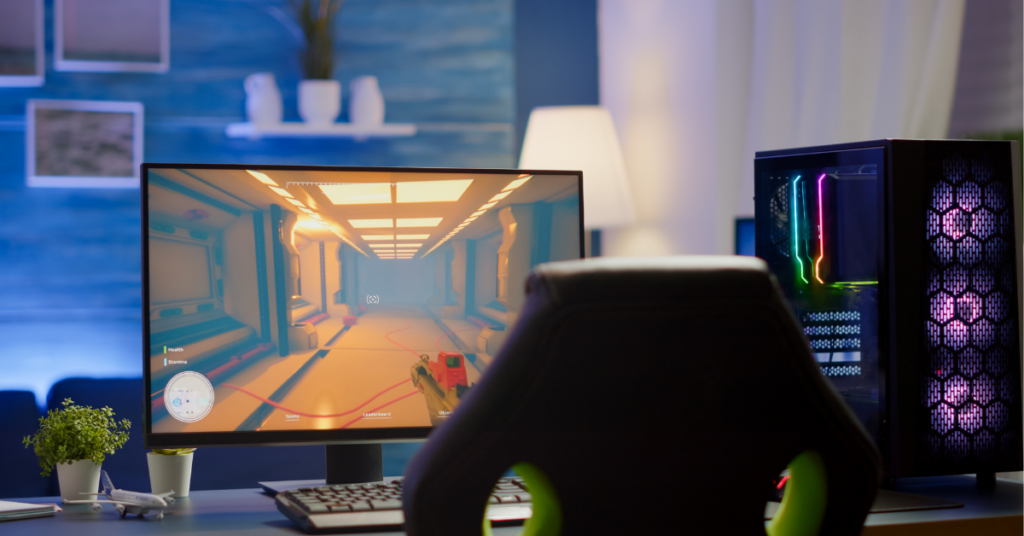Game Designer vs. Game Developer: Which is the Better Career Path?

There’s a way to turn a passion into a full-fledged career? Sign us up! Who wouldn’t want to pursue a hobby that also helps them make money? Gaming has become a highly popular form of entertainment that has transformed into a billion-dollar industry today. That is why many want to convert their gaming passion into a real career. Game artists, developers, and designers are the coveted positions in the field. In this article, we look closely at the difference between video game designer and developer.
Video Game Designer vs Developer
A video game designer works on the creative side of things and focuses on what the game’s aesthetic should be. Game developers, on the other hand, oversee the technical aspect of games by writing code that helps bring the designer’s vision to life.
What is Game Design?
Every game has certain design aesthetics, rules, and a plot that defines the gameplay. Game design is the creative process that visually lays out these gameplay elements. It involves developing creative aspects like conceptualizing the story, creating characters, and making the game fun and engaging for players.
ALSO READ: Game Design: Step Into a Fun, Exciting Career for the Future
What is Video Game Development?
Game development is a technical application of game design that converts ideas and concepts into an actual game using programming languages. It is a multi-step process that involves coding, sound engineering, rendering, and game testing, among others, to get a game up and running successfully.
ALSO READ: How to Become a Game Developer and Create Great Gaming Experiences
 Key Differences Between Game Development and Game Design
Key Differences Between Game Development and Game Design
The function of game design and game development is to create a real-world video game. However, the two roles are quite distinct. For example, we know that game design focuses on the creative aspect of a game while game development revolves around technical elements. Let’s look at some more differences between video game designers vs developers in greater detail.
Curriculum
These are the foundational subjects that fall within the purview of game design:
- 3D modeling
- Concept art
- Scriptwriting
- Advanced animation
- Game engines and analytics
A game development curriculum includes the following subjects:
- Advanced algorithm
- 2D and 3D console programming
- Virtual reality development
- Advanced simulation and tool development
- Software testing
Skills
Apart from having a strong passion for video games, a game designer should be equipped with the following:
- Creative and artistic vision
- Effective communication
- Ability to work with multiple teams
- Problem-solving and analytical skills
- Excellent 3D modeling and drawing skills
On the other hand, a few essential skills that a game developer should have are:
- Impeccable coding and programming skills
- Proficiency in advanced algebra and C++
- Database design and software development
- User interface (UI) design
Qualifications
Game design aspirants can pursue a degree in game design, graphic design, multimedia design, or any other related field. In addition, game developers generally hold a degree in simulation programming, computer science, or software engineering.
Job Roles and Responsibilities
The primary responsibilities within the game design industry are as follows:
- Create and plan new game ideas
- Develop the outline, plot, and characters
- Identify the target audience
- Collaborate with other team members and game developers
The primary responsibilities of a game developer are:
- Communicating with game designers to review layouts
- Generating game storyboards
- Writing effective codes
- Creating prototypes of features
- Testing and improving an existing game
Salary
According to Payscale, the average base salary of a game designer in the U.S. is $67,317, whereas the salary of a game developer is $69,343. When it comes to employment, jobs for web developers and digital designers are estimated to grow by 23% between 2021 and 2031, according to the U.S. Bureau of Labor and Statistics.
Careers with a Game Design Degree 
It is important to note that there is a considerable difference between the career prospects for a video game designer vs developer roles. Game design careers involve several job roles that help build a fascinating world in a game to ensure that users have a fun experience. After pursuing an undergraduate degree in game design or a related field, candidates can expect to work within the following career disciplines:
-
Video game designer
-
Graphic designer
-
Game animator
-
2D/3D artist
-
Character designer
Careers with a Video Game Developer Degree
Those with the required technical expertise, skills, and a degree in game development or a related field can build successful careers as game developers. Since it is a broad field that covers multiple aspects of game production, aspirants can choose from a broad scope of job roles. Some popular careers in game development are:
-
Game programmer
-
Gameplay engineer
-
Artificial intelligence (AI) programmer
-
Quality assurance (QA) game tester
-
Systems designer
Can You be a Game Designer and a Game Developer?
Now that we know the key differences vis-à-vis a video game designer vs a developer, it’s time to find out if one person can take on these two job roles. The short answer is yes. There are various job roles in the gaming industry, like coding, designing, user experience, art, etc., and coding is the most useful of all these skills. Here’s why.
Coding powers everything. Creative concepts, characters, and music all come to life only when programmers write effective codes. Therefore, learning the fundamentals of programming and the creative aspect of game design will help you better understand the technicalities of game development, which can be a decisive advantage. So, game designers can advance in their field of work and take on the role of a game developer.
ALSO READ: Top 10 Inexpensive Ways to Learn How to Code
Should Game Developers Know Game Design and/or Game Programming?
Game design acts as the stepping stone toward creating a video game. Once the aesthetics, characters, rules, and world of the game have been established, it’s up to the game developers to turn this vision into reality. While it isn’t mandatory, it is a good idea for game developers to have a working knowledge of game design.
Not only does the added design insight offer more reference points and a deeper understanding of the vision, but it also helps ease the integration process. After all, game designers are a game’s heart and soul. Game developers must also have basic coding knowledge and object-oriented programming (OOP) skills.
Which is Better: Game Designer or Game Developer?
Both game design and game development are integral aspects of game production, and the two roles go hand in hand. The goal of a game designer is to brainstorm and develop the best vision for a game that effectively describes its overall concept in detail. A game developer’s primary goal is to write codes and deliver programs to implement the designer’s vision while considering technical limitations.
Therefore, when we talk about the video game designer vs developer difference, it is essential to note that these professionals are not competitors but collaborators. They work together to deliver interesting results. And regardless of the role you choose, the prospects in the industry are plenty.
If you are passionate about video games and want to get a head start in this billion-dollar industry, upskill with online technology courses at Emeritus and embark on an exciting career in the video gaming industry!
By Neha Menon
Write to us at content@emeritus.org
















